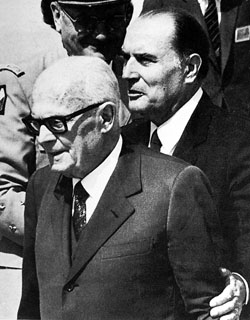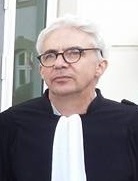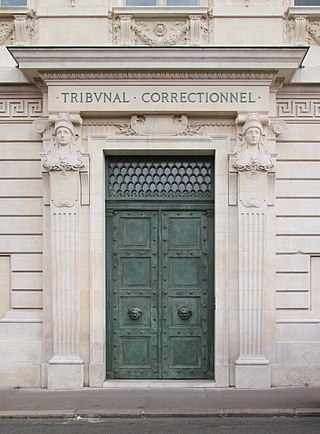Related Research Articles

The Palais de Justice, is a judicial center and courthouse in Paris, located on the Île de la Cité. It contains the Court of Appeal of Paris, the busiest appellate court in France, and France's highest court for ordinary cases, the Court of Cassation. It formerly housed the Tribunal de grande instance de Paris which was relocated in 2018 to a new high-rise building in Paris's Batignolles neighborhood. The Palais de Justice occupies a large part of the medieval Palais de la Cité, the former royal palace of the kings of France, which also includes Sainte Chapelle, the royal chapel, and the Conciergerie, a notorious former prison, which operated from 1380 to 1914. It is located in close proximity to the Tribunal of Commerce, the Prefecture of Police of Paris, and the offices of the Paris Bar Association.
Robert Badinter was a French lawyer, politician, and author who enacted the abolition of the death penalty in France in 1981, while serving as Minister of Justice under François Mitterrand. He also served in high-level appointed positions with national and international bodies working for justice and the rule of law.

La Santé Prison is a prison operated by the French Prison Service of the Ministry of Justice located in the east of the Montparnasse district of the 14th arrondissement in southern Paris, France at 42 Rue de la Santé. It is one of the most famous prisons in France, with both VIP and maximum security sections.

Capital punishment in France is banned by Article 66-1 of the Constitution of the French Republic, voted as a constitutional amendment by the Congress of the French Parliament on 19 February 2007 and simply stating "No one can be sentenced to the death penalty". The death penalty was already declared illegal on 9 October 1981 when President François Mitterrand signed a law prohibiting the judicial system from using it and commuting the sentences of the seven people on death row to life imprisonment. The last execution took place by guillotine, being the main legal method since the French Revolution; Hamida Djandoubi, a Tunisian citizen convicted of torture and murder on French soil, was put to death in September 1977 in Marseille.
In France, a cour d'assises, or Court of Assizes or Assize Court, is a criminal trial court with original and appellate limited jurisdiction to hear cases involving defendants accused of felonies, meaning crimes as defined in French law. It is the only French court that uses a jury trial.

The Vel' d'Hiv' Roundup was a mass arrest of Jewish families by French police and gendarmes at the behest of the German authorities, that took place in Paris on 16–17 July 1942. The roundup was one of several aimed at eradicating the Jewish population in France, both in the occupied zone and in the free zone that took place in 1942, as part of Opération Vent printanier. Planned by René Bousquet, Louis Darquier de Pellepoix, Theodor Dannecker and Helmut Knochen; It was the largest French deportation of Jews during the Holocaust.

The Mitterrand doctrine was a policy established in 1985 by French President François Mitterrand, of the Socialist Party, concerning Italian far-left terrorists who fled to France: those convicted for violent acts in Italy, excluding "active, actual, bloody terrorism" during the "Years of Lead", would not be extradited to Italy.
The Seznec Affair was a controversial French court case of 1923–1924.

William Bourdon is a French lawyer of the Paris Bar Association who practices criminal law, particularly specializing in white-collar crime, communications law and human rights. He particularly specializes in defending the victims of globalization and crimes against humanity. He has been with Bourdon Simoni Voituriez since 1979. He is widely considered one of the most powerful international lawyers

In France, a cour d’appel of the ordre judiciaire (judiciary) is a juridiction de droit commun du second degré, a. It examines judgements, for example from the correctional tribunal or a tribunal de grande instance. When one of the parties is not satisfied with the verdict, it can appeal. While communications from jurisdictions of first instance are termed "judgements", or judgments, a court of appeal renders an arrêt (verdict), which may either uphold or annul the initial judgment. A verdict of the court of appeal may be further appealed en cassation. If the appeal is admissible at the cour de cassation, that court does not re-judge the facts of the matter a third time, but may investigate and verify whether the rules of law were properly applied by the lower courts.

In France, the correctional court is the court of first instance that has jurisdiction in criminal matters regarding offenses classified as délits committed by an adult. In 2013, French correctional courts rendered 576,859 judgments and pronounced 501,171 verdicts.
In France the jurisdictions of the ordre judiciaire, of the French court system are empowered to try either litigation between persons or criminal law cases. They may intervene:
Jacqueline Sauvage of Montargis, France, killed her husband Norbert Marot by shooting him in the back three times with a hunting rifle on 10 September 2012. This occurred the day after Sauvage's son committed suicide. Sauvage stated that Mr Marot had physically and sexually abused his wife, daughters and possibly his son.
Sarah Halimi was a retired French doctor and schoolteacher who was attacked and killed in her apartment on 4 April 2017. Circumstances surrounding the killing—including the fact that Halimi was Jewish, and that the assailant had shouted Allahu akbar during the attack and afterward proclaimed "I killed the Shaitan"—cemented the public perception, particularly among the French Jewish community, that it was a stark example of antisemitism in modern France.
Marcel Henri Barbeault is a French serial killer who murdered eight people in Nogent-sur-Oise in the 1970s. He is responsible for the murder of seven women and one man. Because his crimes were always in the evening or early in the morning, he was given the nickname The Shadow Killer.
Karim Achoui is a French-Algerian lawyer.
Philippe Brizard was a French actor.
Thierry Lévy was a high-profile French criminal defence lawyer who spent his career in a state of permanent opposition to the French legal establishment. Admitted to the Paris bar in 1969, he went on to appear in a succession of well publicised criminal trials during the ensuing three and a half decades. His father had been a journalist and press proprietor who was not infrequently supportive of nationalist and other right-wing movements. Thierry Lévy's own assessments of the French criminal justice system, which he shared frequently through the print media and, especially during his later years, in television debates, placed him firmly at the liberal-left end of the political spectrum, however. He was a prominent and eloquent backer of the campaign that led to the abolition of the death penalty by Justice Minister Robert Badinter under President Mitterrand in 1981.

French criminal law is "the set of legal rules that govern the State's response to offenses and offenders". It is one of the branches of the juridical system of the French Republic. The field of criminal law is defined as a sector of French law, and is a combination of public and private law, insofar as it punishes private behavior on behalf of society as a whole. Its function is to define, categorize, prevent, and punish criminal offenses committed by a person, whether a natural person or a legal person. In this sense it is of a punitive nature, as opposed to civil law in France, which settles disputes between individuals, or administrative law which deals with issues between individuals and government.
Jean-Louis Pelletier was a French criminal lawyer.
References
- ↑ Le Solleu, Bernard. "Philippe Maurice, sauvé de la guillotine en 1981". Ouest-France.
- ↑ http://cewamale.free.fr/Geneami/condamnations.html
- ↑ "Un meurtrier de vingt-trois ans". Le Monde.
- ↑ "Gardien de la paix Gérard CROUX". Mémorial des Policiers français Victimes du Devoir.
- ↑ "Jean-Yves RUELLE". Mémorial des Policiers français Victimes du Devoir.
- ↑ https://www.lemonde.fr/archives/article/1980/10/24/philippe-maurice-est-juge-pour-le-meurtre-d-un-policier_2811705_1819218.html
- ↑ https://www.lemonde.fr/archives/article/1980/10/24/philippe-maurice-est-juge-pour-le-meurtre-d-un-policier_2811705_1819218.html
- ↑ https://www.ouest-france.fr/leditiondusoir/2024-02-09/robert-badinter-l-a-sauve-voici-l-histoire-du-dernier-condamne-a-mort-francais-devenu-historien-c1eb6814-8bed-4f0b-aaff-5e6ecb94d7d3
- ↑ http://cewamale.free.fr/Geneami/condamnations.html